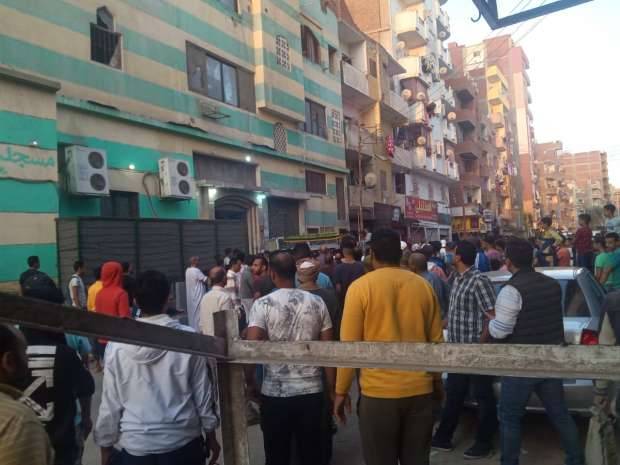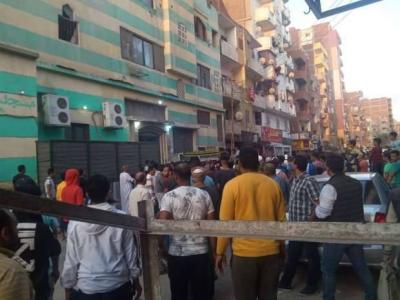Despite the denial from the relatives of the victim who was beheaded on Monday in downtown Ismailia, the case remains shrouded in mystery and horrific details. The controversy extends beyond the unfortunate crime itself, encompassing the behavior of bystanders during the incident, many of whom filmed the crime in detail without intervening to stop it. This raised numerous questions about the absence of bravery and honor in our streets.
In this context, Egyptian media reported one eyewitness as saying, "The fight had been going on for half an hour before the murder, and when people intervened, he told them he raped my mother and my sister, so no one intervened." He added, "After the murder, the killer was in a hysterical state, shouting and claiming he raped my mother and sister while cursing."
Issam Al-Badri from Ismailia stated that the killer, Abdel Rahman, nicknamed Dabour, worked as a fishmonger but was expelled from his job over two months ago due to drug use, including the substance known as "Strox." He often muttered incomprehensible words, leading some to believe he was possessed. According to his coworkers, he frequently claimed to be "the sword of God," was very ritualistic in his ablutions, but did not pray.
**Public Prosecution Investigations**
According to public prosecution investigations, the killer had previously been seen at a vegetable vendor's near the fish shop from which he was expelled, where he claimed he would slaughter the shop owners who fired him. Coincidentally, the shop was closed at the time of the incident.
The killer executed the crime with precision at the intersection of Tanta and Bahr streets in the heart of the city during broad daylight, where he beheaded a man and paraded the severed head among bystanders in a bizarre and tragic scene.
Not only was the killer found to be mentally disturbed, but Magda El-Nouishi, the former secretary of the Women’s Council in Ismailia, commented on the incident via her official page, asserting that not only was the killer disturbed, but the true dysfunction lies in the behavior of the people present during the crime, who failed to contact security or subdue him. She emphasized that we are facing a phenomenon of cowardice, fear, and a lack of honor. She called for the return of police presence in the streets.
Security sources revealed that the perpetrator's name is Abdel Rahman Dabour. The Ismailia Prosecution began to review footage from surveillance cameras at the crime scene and succeeded in apprehending the accused within minutes of the incident.
The sources further disclosed that the accused is psychologically unstable, having previously been detained in a rehabilitation facility for addiction due to an incident in which he attacked a worker with a machete, decapitating him while mumbling incoherent phrases. After investigation, it was indicated he had worked at a furniture store belonging to the victim's brother, and legal measures were taken.
A team from the public prosecution traveled to the site of the beheading in downtown Ismailia to investigate the scene of the tragic event. Official sources identified the victim as Mohamed El-Sadek, aged 42, a resident of Al-Balabsa. Reports stated that a person was beheaded at the intersection of Bahr and Tanta streets, where the perpetrator proceeded calmly among citizens while holding the head after severing it from the body, leading to the corpse being taken lifeless to the hospital.
The security authorities in Ismailia received a report from residents about a person who had decapitated another in Tanta street. The security forces arrived at the scene and arrested the accused, sending him to public prosecution.
Investigations revealed that residents in Tanta street in Ismailia dragged the suspect until they handed him over to police officers. It was noted that the accused worked at a furniture store owned by the victim's brother and that prior disagreements arose between them due to claims that the victim had sexually assaulted his sister and mother, leading the accused to seek revenge in public.
**Show of Violence and Power**
An eyewitness confirmed that after committing the crime, the perpetrator carried the victim's head and walked calmly through the street, showcasing his violence and power, which enraged the residents. They pursued him down Bahr Street in Ismailia and apprehended him while calling emergency police.
Another witness reported that the killer held the victim's head in one hand and a machete in the other, threatening bystanders, which emboldened him as he continued to murder and dismember the body while maintaining possession of the victim’s severed head until a group of residents managed to catch him.
The witness indicated that the dead man lived in the adjacent building and had allegedly sexually assaulted the killer's mother and sister, prompting the killer to avenge his family's honor publicly, as he claimed.
Meanwhile, the victim’s brother confirmed that on the day of the incident, the deceased had gone out to bring breakfast for his family and received a call from a friend who informed him that his brother had been killed and was lying in the street. He mentioned that the killer had previously worked with the victim in the furniture store on Tanta street.
After several hours, the brother shared with the media that the accused had proposed buying some used furniture items from him just two days prior, stating, "We considered him one of our own, and my brother was the one who raised him." He denied the killer's accusation of sexual misconduct against his family members, affirming that the victim was old, suffered from liver disease, was married, and had seven children.
The victim's brother, Ahmed Diab, demanded immediate retribution for his brother’s murder, emphasizing they would not accept condolences until they received just punishment for the killer. He highlighted that they were part of one of the largest families in Upper Egypt, according to the Egyptian daily Al-Masry Al-Youm.
Mohamed Adel, a nephew of the victim and a lawyer, explained that the stoic demeanor exhibited by the victim's family was characteristic of the strong-willed people of Upper Egypt, who typically do not engage in mourning or condolence until justice is served. He believed they would celebrate following the execution of the killer, which was witnessed by many.
With great anger, Issam, the victim's brother and a trader in used furniture, stated that the only solution to quell his family's fury was "the execution" within 15 days, referring to the necessity of swift justice. He expressed confidence in the ability of the Ministry of Interior and the public prosecution to fulfill this demand for justice.
**No Evidence Needed**
"No evidence needed," was the phrase used by Adel, the elder brother of the victim and a workshop owner, who asserted that the entire world witnessed his brother’s beheading and insisted that swift and just retribution was the only way to restore his brother's honor, whom he described as a martyr for his livelihood and a victim of treachery.
Adel refuted claims that the killer justified his crime based on a supposed relationship between his brother and the killer's mother, declaring such statements baseless. He mentioned that the killer's family was respectable and that they knew them well, expressing his shock at the actions of their son.
He remarked that he knew the killer well and indicated he had been undergoing treatment for addiction to a dangerous narcotic called "shabu," which alters one's mind and inhibits free will, asserting that the crime was committed under the influence of drugs as confirmed by witnesses.
Adel denied any issues between the killer and his brother and indicated that his brother had seven children (three sons and four daughters), worked in scrap trading, and barely managed to provide for his family, with no prior working relation or disputes existing between him and the killer.




